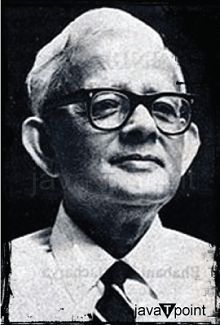Bhabani Bhattacharya
IntroductionBengali-born Indian author Bhabani Bhattacharya specialized in socially realistic novels. He was born on November 10th, 1906, and passed away on October 10th, 1988. He was born in Bhagalpur, a region of British India's Bengal Presidency. Bhattacharya graduated from Patna University with a bachelor's degree and from the University of London with a doctorate. After traveling back to India, he joined the diplomatic corps. Bhattacharya served his country in the United States, where he later settled and worked as a literary studies instructor. He taught in Hawaii before moving on to Seattle. Bhattacharya started penning fiction in his mid-thirties based on socially and historically accurate settings. He chose the language of English as his writing style after consulting with two eminent authors. Personal LifeBhattacharya was born in Bhagalpur, a region of British India's Bengal Presidency. He was born to Bengali parents. Bhattacharya completed his undergraduate studies in English literature at Patna University. The following year, he finished his graduate studies in the U.K. He initially intended to do so in literature, but after one of the instructors showed hostility, he changed his mind and decided to do it in history. The University of London awarded Bhattacharya master's and doctoral degrees in 1931 and 1934, respectively. Bhattacharya was a graduate student when he joined Marxist groups and was greatly affected by one of his professors, Harold Laski. Additionally, he was active in literary circles and had writings appear in several publications and newspapers. Bhattacharya made friends with The Spectator's editor, Francis Yeats-Brown when some of his articles were published there. Rabindranath Tagore and Bhattacharya conversed at this time. In 1930, he translated The Golden Boat, a poem by Tagore, into English. Bhattacharya was persuaded to write his novels in English rather than Bengali by Yeats-Brown and Tagore. Bhattacharya traveled to Calcutta after completing his doctoral studies, where he quickly got married. After a few years, he entered the diplomatic service, working as a press attaché in the Indian Embassy in Washington, D.C., before returning to India. Bhattacharya moved permanently to Seattle to assume a position at the University of Washington after accepting an invitation to serve as a visiting faculty member at the University of Hawaii. Writing StyleBhattacharya is categorized as a member of the Indo-Anglian literature school of social realism. His compositions reveal the influence of Mahatma Gandhi and Rabindranath Tagore. Using humor and situational situations to make his views more relatable, Bhattacharya took a pedagogical method to create novels out of concepts, unlike other social realists like Prem Chand. Bhattacharya's Fiction"Art must teach, but unobtrusively, by its vivid interpretations of life. Art must preach, but only by its being a vehicle of truth. If that is propaganda, there is no need to eschew the word." Bhabani Bhattacharya thought that a work of fiction needed to have this. His conception of art was motivated by lofty morality, but he rarely succeeded in doing so, except in one or two of his books. Famous Indian English literature scholar M K Naik thinks that Bhabani Bhattacharya tended to settle for simple romantic resolutions and be pleased with showing too tidy and manufactured contrast. However, his most well-known book demonstrated that he could produce something that represented good fiction. So Many Hungers demonstrated that Bhabani's style, theme, and story choice could not be restrained when the time came to let them loose. His book was realistic and served a social purpose, displaying what must be seen in society. However, his other books rarely achieved the same respect. Notable WorksSome of his notable works include: Some Memorable Yesterdays (Pustak Bhandar, 1941) Steel Hawk and Other Stories (Hind Pocket Books Ltd., 1968) Gandhi the Writer (National Book Trust, 1969) Indian Cavalcade (Nalanda Publications, 1948) So Many Hunger! (Hind Kitabs Limited, 1947) Shadow from Ladakh (Hind Pocket Books Ltd., 1966) A Dream in Hawaii (The MacMillan Company of India Limited, 1978) AwardsHe received the Sahitya Akademi Award in 1967. ConclusionBhabani Bhattacharya became well-known because he tried to show the public what we as a society missed and what we had in abundance. His pre- and post-independence books focused on the horrors the British committed on Indians, while his other works explored the East-West meetings that, for a long time, upended people's lives in India. His books attempted to experiment with topics and stories in some cases, and while some failed, others succeeded. https://peoplepill.com/people/bhabani-bhattacharya
Next TopicBirsa Munda
|
 For Videos Join Our Youtube Channel: Join Now
For Videos Join Our Youtube Channel: Join Now
Feedback
- Send your Feedback to [email protected]
Help Others, Please Share









